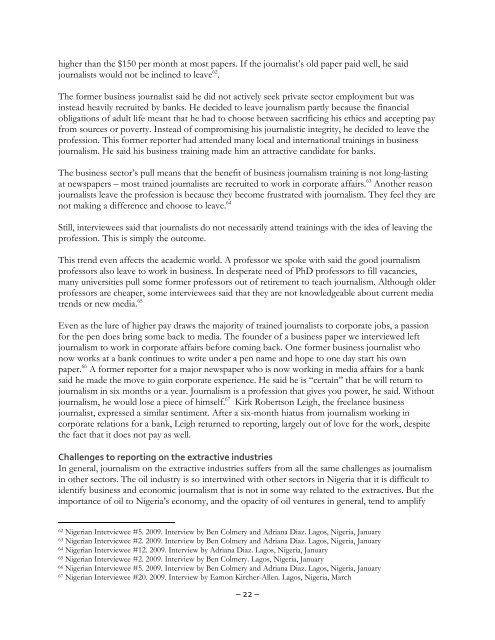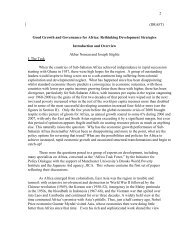higher than the $150 per month at most papers. If the journalist’s old paper paid well, he saidjournalists would not be inclined to leave 62 .The <strong>for</strong>mer business journalist said he did not actively seek private sector employment but wasinstead heavily recruited by banks. He decided to leave journalism partly because the financialobligations of adult life meant that he had to choose between sacrificing his ethics and accepting payfrom sources or poverty. Instead of compromising his journalistic integrity, he decided to leave theprofession. This <strong>for</strong>mer reporter had attended many local and international trainings in businessjournalism. He said his business training made him an attractive candidate <strong>for</strong> banks.The business sector’s pull means that the benefit of business journalism training is not long-lastingat newspapers – most trained journalists are recruited to work in corporate affairs. 63 Another reasonjournalists leave the profession is because they become frustrated with journalism. They feel they arenot making a difference and choose to leave. 64Still, interviewees said that journalists do not necessarily attend trainings with the idea of leaving theprofession. This is simply the outcome.This trend even affects the academic world. A professor we spoke with said the good journalismprofessors also leave to work in business. In desperate need of PhD professors to fill vacancies,many universities pull some <strong>for</strong>mer professors out of retirement to teach journalism. Although olderprofessors are cheaper, some interviewees said that they are not knowledgeable about current mediatrends or new media. 65Even as the lure of higher pay draws the majority of trained journalists to corporate jobs, a passion<strong>for</strong> the pen does bring some back to media. The founder of a business paper we interviewed leftjournalism to work in corporate affairs be<strong>for</strong>e coming back. One <strong>for</strong>mer business journalist whonow works at a bank continues to write under a pen name and hope to one day start his ownpaper. 66 A <strong>for</strong>mer reporter <strong>for</strong> a major newspaper who is now working in media affairs <strong>for</strong> a banksaid he made the move to gain corporate experience. He said he is “certain” that he will return tojournalism in six months or a year. Journalism is a profession that gives you power, he said. Withoutjournalism, he would lose a piece of himself. 67 Kirk Robertson Leigh, the freelance businessjournalist, expressed a similar sentiment. After a six-month hiatus from journalism working incorporate relations <strong>for</strong> a bank, Leigh returned to reporting, largely out of love <strong>for</strong> the work, despitethe fact that it does not pay as well.Challenges to reporting on the extractive industriesIn general, journalism on the extractive industries suffers from all the same challenges as journalismin other sectors. The oil industry is so intertwined with other sectors in Nigeria that it is difficult toidentify business and economic journalism that is not in some way related to the extractives. But theimportance of oil to Nigeria’s economy, and the opacity of oil ventures in general, tend to amplify62 Nigerian Interviewee #5. 2009. Interview by Ben Colmery and Adriana Diaz. Lagos, Nigeria, January63 Nigerian Interviewee #2. 2009. Interview by Ben Colmery and Adriana Diaz. Lagos, Nigeria, January64 Nigerian Interviewee #12. 2009. Interview by Adriana Diaz. Lagos, Nigeria, January65 Nigerian Interviewee #2. 2009. Interview by Ben Colmery. Lagos, Nigeria, January66 Nigerian Interviewee #5. 2009. Interview by Ben Colmery and Adriana Diaz. Lagos, Nigeria, January67 Nigerian Interviewee #20. 2009. Interview by Eamon Kircher-Allen. Lagos, Nigeria, March– 22 –
the effects of these challenges <strong>for</strong> journalists directly writing about the sector. This is especially true<strong>for</strong> journalists reporting from the Niger Delta, which, although we did not personally visit it, weunderstand to present a much more difficult environment <strong>for</strong> media.The lack of resources available to journalists is one example of a challenge that the demands of theextractive industry amplify. Ibanga Isine, the Port Harcourt-based editor of Punch, said thatjournalists working <strong>for</strong> Nigerian media outlets cannot hope to offer comprehensive coverage of oilspills because they lack the transportation, security and recording equipment to venture into theswamps. Isine described watching in frustration as CNN and other international media – often inNigeria on a very temporary basis – got exclusive coverage of environmental disasters that directlyaffected local communities.This dynamic, Issine said, also means that international media report on the Nigerian oil industryonly as a series of crises.“What CNN sees is not what I see,” he said. “What they see is crisis – what they want is crisis. Butyou can also see the positive things: in spite of the crisis, the oil is still being exported. One begins towonder whether the media is helping the crisis.”A media consultant said that extractive sector reporting focuses too much on the criminal aspect ofoil. He said reporting should focus on core and technical challenges, such as the disconnect betweenthe Nigerian oil sector and Nigerian society. “Nigeria could go on fire and burn down and the oilindustry wouldn’t even notice,” he said. 68Journalists reported that access to in<strong>for</strong>mation is also particularly difficult when covering the oilindustry. Oil companies wield an enormous amount of power, and even more than Lagos-basedbanks and other businesses are under no pressure to respond in a timely manner to in<strong>for</strong>mationrequests. When responding to breaking news, Issine said, oil companies are in no rush to releaserelevant in<strong>for</strong>mation. “We try all we can to get everyone in government and oil companies to tellyou exactly what happened, but it takes about eight hours to get back to you,” he said. “No matterhow good you are, where you are trained, the level of your education – when the attitude, cultureand infrastructure on the ground are not there, you can’t be there.”On the other hand, even when journalists can get in<strong>for</strong>mation from oil companies, they may nothave the expertise to contextualize it in their reporting. There is a minimum of extractive industryspecialization offered in mass communications programs, and even in the most comprehensivejournalism training programs we canvassed, extractives training was at most a small section of thecurriculum. In fact, oil companies are often the only entities offering training to journalists coveringthe oil industry. This, of course, means that even when oil companies are genuinely invested intraining, the line between training and propaganda can become blurry.Interviewees said that journalists covering extractive industries need to have a better understanding69 70of petroleum pricing and oil industry accounting standards, which are not standardized.68 Nigerian Interviewee #2. 2009. Interview by Adriana Diaz. Lagos, Nigeria, January69 Nigerian Interviewee #3. 2009. Interview by Ben Colmery and Adriana Diaz. Lagos, Nigeria, January70 Nigerian Interviewee #12. 2009. Interview by Adriana Diaz. Lagos, Nigeria, January– 23 –
- Page 1 and 2: THEREWILLBE INKA study of journalis
- Page 3 and 4: AcknowledgementsThis paper has bene
- Page 7 and 8: Executive SummaryPurpose of the Rep
- Page 9 and 10: journalists in these countries that
- Page 11 and 12: Existing International Training Opp
- Page 13 and 14: • Consumer Affairs and Informatio
- Page 15 and 16: Background 3Of the three countries
- Page 17 and 18: pervasive conflict in the Niger Del
- Page 19 and 20: 3) Crises or disruptions, where som
- Page 21 and 22: Low pay and low regardOne of the mo
- Page 23 and 24: Even in cases where working journal
- Page 25 and 26: But while some reporters think FOIB
- Page 27: When asked how much the media could
- Page 31 and 32: detailed analysis of the opportunit
- Page 33 and 34: journalist said he has, however,
- Page 35 and 36: completely make use of some of the
- Page 37 and 38: money. Their knowledge of what medi
- Page 39 and 40: Notes on conducting research in Nig
- Page 41 and 42: Ghana- 35 -
- Page 43 and 44: evenues each year,” 106 which wou
- Page 45 and 46: entertainment news, scandals, and p
- Page 47 and 48: The rise of business-focused journa
- Page 49 and 50: coverage of the oil industry is als
- Page 51 and 52: needed supplementary income to cash
- Page 53 and 54: as supporting one political party o
- Page 55 and 56: Numerous journalists recounted how
- Page 57 and 58: Training programs available to busi
- Page 59 and 60: Amos Safo, editor-in-chief at the p
- Page 61 and 62: Notes on conducting research in Gha
- Page 63 and 64: Background 136Literacy and Educatio
- Page 65 and 66: “sufficient information” about
- Page 67 and 68: or criminal charges for content the
- Page 69 and 70: have such difficulty obtaining info
- Page 71 and 72: The majority of those interviewed b
- Page 73 and 74: commitment to their profession and
- Page 75 and 76: Notes on Conducting Research in Uga
- Page 77 and 78: Recommendations for Revenue Watch I
- Page 79 and 80:
people who have no journalism backg
- Page 81 and 82:
analyzes business,” he said, “e
- Page 83 and 84:
A journalist with The Punch said,
- Page 85 and 86:
The Media Foundation for West Afric
- Page 87 and 88:
Length of TrainingRoughly three-qua
- Page 89 and 90:
industries, for instance, ought to
- Page 91 and 92:
otherwise being published in the pr
- Page 93 and 94:
Non-Training Recommendations for Ug
- Page 95 and 96:
Appendix A: NigeriaPotential Partne
- Page 97 and 98:
journalists. Biakolo is very profes
- Page 99 and 100:
Television Stations• Nigerian Tel
- Page 101 and 102:
have two to four month professional
- Page 103 and 104:
City: AccraTelephone: +233 (021) 22
- Page 105 and 106:
Fax: +256 414 255 495E-mail: umdf@a
- Page 107 and 108:
• What do you think are the most
- Page 109 and 110:
Appendix E: Survey Questions1. Name
- Page 111 and 112:
18. How effective were the teaching
- Page 113 and 114:
28. What are the most important cha
- Page 115 and 116:
1. Journalists by Country2. How wou
- Page 117 and 118:
5. How often do you travel out of t
- Page 119 and 120:
9. Which organization(s) sponsored
- Page 121:
12. After completing the training(s














